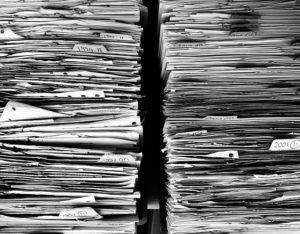 Are your filing drawers overflowing? Do you have several stacks of paper documents with no idea as to which you need and which belong in the trash? Are you overly concerned that the IRS will come knocking at your door and you won’t have something you need? Your stress is over. This checklist on how long to keep all your financial and other important documents will help guide you!
Are your filing drawers overflowing? Do you have several stacks of paper documents with no idea as to which you need and which belong in the trash? Are you overly concerned that the IRS will come knocking at your door and you won’t have something you need? Your stress is over. This checklist on how long to keep all your financial and other important documents will help guide you!
Documents to Keep Forever
- Income tax returns
- CPA audit reports
- Deeds, mortgages and bills of sale
- Legal documents (wills, living wills, power of attorney designation, medical and burial instructions, beneficiary documents)
- Vital records (birth, death, marriage, divorce, adoption)
- Investment trade confirmations and statements that indicate buying and selling, retirement and pension records, year-end statement for investments
- Trust documents
- Receipts for warranties
- Automobile titles
- Current insurance policies
- Medical records
- Education records
- Important correspondence
- Property records (keep until sale of property)
- Car records (keep until sale of car)
- Insurance policies (keep for life of policy)
Documents to Keep for 7 Years
The IRS may go back 7 years to audit your tax returns for errors or incorrectly claimed deductions – so it’s important that you keep all tax-related documents for that length of time.
- Bank records
- W-2 and 1099 forms
- Receipts for tax purposes
- Personnel and payroll records
- Cancelled checks
- Disability records
- Unemployment benefit records
- Settled accident claims
- Mortgages, deeds, leases on sold property
- Records on sold stocks and bonds
Documents to Keep for 1 Year
It’s rare that anyone is going to want to see an electric bill or credit card statement dating back more than a year. But you may choose to keep the following NON-TAX-RELATED papers:
- Checkbook ledgers
- Paycheck stubs (keep until reconciled with W-2)
- Monthly financial statements
- Monthly mortgage statements
- Credit card statements
- Utility records
- Medical bills (in case of insurance disputes)
Documents to Keep Less Than 1 Year
There are always those papers that don’t fit into any of these categories. Retain these records according to the following guidelines:
- Credit card receipts (keep until reconciled on your credit card statement)
- ATM and deposit slips (keep until reconciled on your bank statement)
- Bills (keep until the payment verified on the next bill)
Now, it’s time to simplify!
Now that you know the guidelines on how long to keep all of your documents, it’s time to get organized. Start cleaning out those file cabinets or sorting through those paper stacks that are taking up space and causing you stress.
*NOTE: This checklist is a guideline. Please be sure to consult your accountant and/or the IRS for the most up-to-date rules.
If you don’t have the time to get your business and personal documents organized, Top Shelf Home Organizing would love to help. Call Jayme: 262-373-9416.
